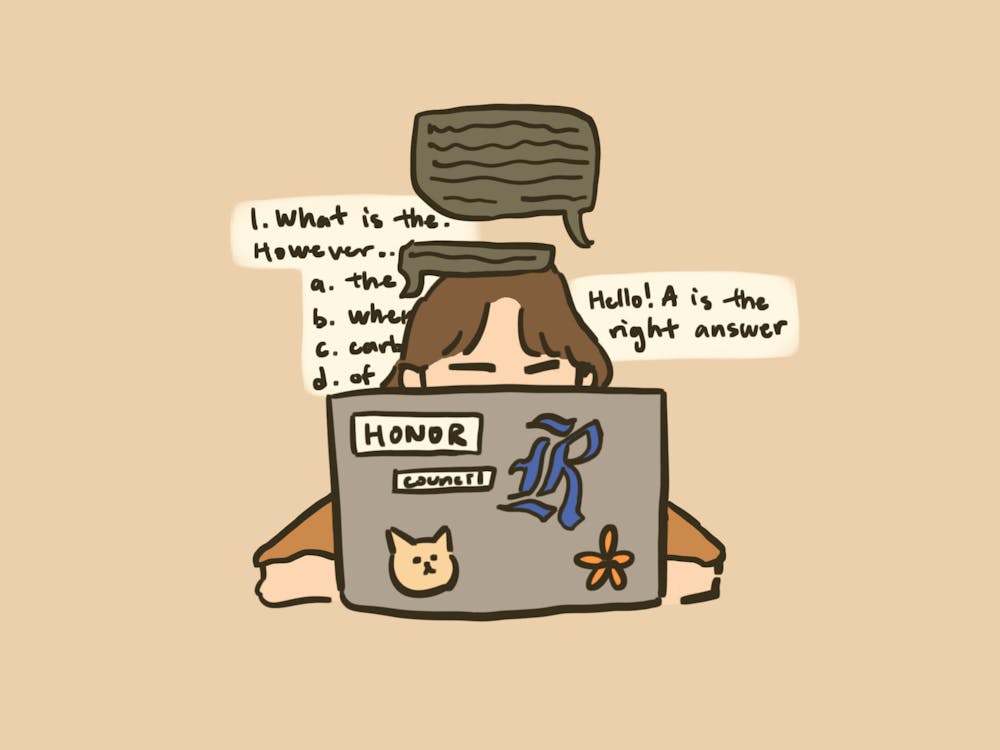Honor Council passes new amendment allowing confidential accusations

Students can now confidentially accuse each other of honor code violations, according to a procedural amendment the Honor Council announced in an email to students March 27. Violations can be reported anonymously by students through a Google Form, while faculty and teaching assistants will continue reporting violations through email.
The new process implements a preliminary investigation, where the Honor Council reviews the accusation and may contact the instructor or involved parties to determine if the accusation has merit, according to the email. During a preliminary review, the Honor Council cannot reach out to the accused student — if the accusation is found baseless during this step, the accused student would never be notified and an investigation wouldn’t proceed. If an investigation moves forward, the accused student would then be notified. The accuser wouldn’t receive updates on the case.
Honor Council has included provisions to prevent abuse of the confidential form, communications chair Olivia Thom said. One remedy is the new use of a preliminary review, which scraps baseless allegations before they proceed into a formal investigation.
“Another consideration was, ‘What if the student wants to see the other student just get screwed over?’ So that’s why one of the procedural factors was that we don’t tell the person who accused the student any updates,” Thom, a Duncan College sophomore, said.
Honor Council judicial chair Pedro Ribeiro distinguished between confidential and anonymous accusations, clarifying that this new amendment would only allow the former.
“It’s not anonymous because [Honor Council] knows who submitted the accusation,” Ribeiro, a McMurtry College junior, said. “It’s just not disclosed to the accused student.”
Prior to this amendment, the accuser’s identity was divulged at the hearing — now, their identity is protected throughout the investigation.
Ribeiro said that this amendment comes after an increased demand for confidential accusations this year.
“This year specifically, we’ve received several accusations, with some from students,” Ribeiro said. “We’ve also seen an informal increase in students asking, ‘Oh, if I accuse a student, will my identity be revealed?’ Students are generally unwilling to come forward if their identity is revealed.”
Thom added that this new amendment was passed with hopes of increasing student engagement.
“We wanted to focus on the student aspect of the honor code,” Thom said. “After all, our council is student-run. We thought that it is paramount to keep the spirit of the code that students have the ability to have trust amongst themselves. We wanted to make sure that they are included in the process and don’t feel ostracized for the process.”
Gabriel Ong, a Brown College sophomore, said he can understand how this new amendment could “make people more comfortable with upholding honor,” but he doesn’t think it will garner widespread support from the student body.
“It’s nice to know who your opps are. From the perspective of the general student body, the new resolution seems like a convenient way for snitches to get away without the requisite — and some might say deserved — social punishment they would otherwise have to face,” Ong said.
More from The Rice Thresher
Rice welcomes 7.8% of applicants to class of 2029
Rice accepted 2,852 applicants to the class of 2029 March 26, said Yvonne Romero, vice president for enrollment. This represents 7.8% of 36,777, the highest acceptance rate since 2022.

Neurologist Huda Zoghbi announced as commencement speaker
Huda Zoghbi was announced to be the speaker for Rice’s 122th commencement, March 26. Zoghbi is a professor of molecular and human genetics at Baylor College of Medicine.

Out with the old, in with the new
Rice Athletics fired baseball head coach José Cruz Jr. on March 13, less than a month into the season. The baseball team was 2-14 and on a 10 game losing streak at the time of his firing. Just days later, Rice welcomed baseball veteran David Pierce to fill Cruz’s seat.


Please note All comments are eligible for publication by The Rice Thresher.